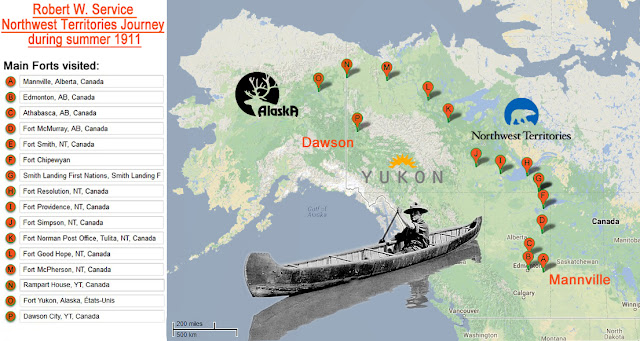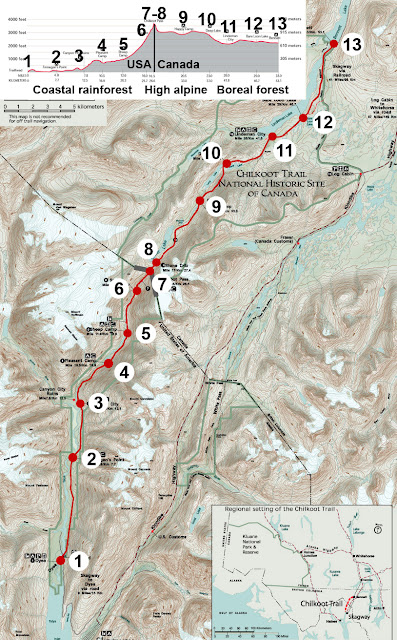Alaska-Canada 2022-7: Klondike Loop 4 - The Bard of the North
A major attraction for Doug in Dawson City is a visit to the two-room cabin of the "Bard of the North," Robert Service.
Robert Service Cabin, 8th Ave, Dawson City, Yukon Territory
In his early twenties, Service traveled to Canada, San Francisco, the Southwest. In 1903, he became a bank clerk in Victoria, Vancouver Island, British Columbia. In 1904, he was transferred to Whitehorse, Yukon Territory.
Soon after arriving in Whitehorse, Service traveled to the two entry points to the Yukon for the Klondike Gold Rush, Skagway and Dyea, Alaska. Once bustling towns of thousands, by the time Service arrived, the gold rush had waned, and the two towns were dying.
Service's first book of poems, Songs of a Sourdough, was published in 1906, before he had ever set foot in Dawson City. In 1908 he was finally transferred there.
Service met veterans of the 1898 Klondike Gold Rush who had stayed on in Dawson City, and was enthralled by their stories of the Chilkoot Trail, of traveling the Yukon in homemade boats, of the perils of Five Finger Rapids. He listened to their tales of mining camps, gold strikes, tragedy, and financial losses.
When the bank wanted Service to return to Whitehorse in 1909, he resigned. Then he rented a two-room log cabin in Dawson Cit. For the next two years, he wrote full time.
In 1911, with the income from his first novel, The Trail of '98, Service left Dawson City and began to travel widely. But as recounted in Alaska History Magazine, something gnawed at him: he felt like a fraud. His livelihood came from writing about the Klondike Gold Rush, but he had not experienced any of the hardships of the Klondikers. He had not climbed the Chilkoot Trail. He had not built a makeshift boat to brave the mighty Yukon River. He had not suffered cold, hunger, fatigue, and illness in the hopes of striking gold.
That same year, Service determined to take the 2,000-mile Edmonton Trail to Dawson City. He bought a birch bark canoe, which he named Coquette (Flirtatious), and set out.

In On the Trail of Robert Service, G. W. Lockhart recounts Service's journey. He canoed the Mackenzie, Rat, Porcupine, and Yukon Rivers; hitched a ride on a scow; portaged his canoe; and finally loaded his canoe onto a sternwheeler he encountered on the Yukon River for the final leg back to Dawson City. Now he felt he had earned his sourdough stripes.
Back in Dawson City again, Service returned to his cabin. There he wrote a third book of poetry, Rhymes of a Rolling Stone.
In Europe, Service became a Toronto Star war correspondent during the Balkan Wars and subsequently an ambulance driver during WWI. In Paris, he met his wife, Germaine. The couple had twin girls, one of whom died in infancy.
One of Service's most famous poems, "The Cremation of Sam McGee," begins:
There are strange things done in the midnight sun
By the men who moil for gold;
The Arctic trails have their secret tales
That would make your blood run cold;
The Northern Lights have seen queer sights,
But the queerest they ever did see
Was that night on the marge of Lake Lebarge
I cremated Sam McGee.
Now Sam McGee was from Tennessee, where the cotton blooms and blows.
Why he left his home in the South to roam 'round the Pole, God only knows.
He was always cold, but the land of gold seemed to hold him like a spell;
Though he'd often say in his homely way that "he'd sooner live in hell."
By that time money was no issue. Service and his family later lived in California and finally in the Monte Carlo section of Monaco. Service died there in 1958 and Germaine in 1988.
Robert Service Cabin, 8th Ave, Dawson City, Yukon Territory
On our 2017 visit to the cabin, the docent recited "Goodbye, Little Cabin." On this trip, as we waited for the docent's arrival,
Doug recited it to me. The first verse:
O dear little cabin, I've loved you so long,
And now I must bid you good-bye!
I've filled you with laughter, I've thrilled you with song,
And sometimes I've wished I could cry.
Your walls they have witnessed a weariful fight,
And rung to a won Waterloo:
But oh, in my triumph I'm dreary to-night --
Good-bye, little cabin, to you!
Born in England in 1874 of Scottish heritage, Service lived in Glasgow from childhood. As a young man, he became a banking apprentice. He loved to read, and was influenced by Stevenson, Kipling, Thoreau, and other wanderers.
Doug recited it to me. The first verse:
O dear little cabin, I've loved you so long,
And now I must bid you good-bye!
I've filled you with laughter, I've thrilled you with song,
And sometimes I've wished I could cry.
Your walls they have witnessed a weariful fight,
And rung to a won Waterloo:
But oh, in my triumph I'm dreary to-night --
Good-bye, little cabin, to you!
Robert Service on the steps of his Dawson City cabin.
Born in England in 1874 of Scottish heritage, Service lived in Glasgow from childhood. As a young man, he became a banking apprentice. He loved to read, and was influenced by Stevenson, Kipling, Thoreau, and other wanderers.
Another wanderer enjoying the Robert Service cabin.
In his early twenties, Service traveled to Canada, San Francisco, the Southwest. In 1903, he became a bank clerk in Victoria, Vancouver Island, British Columbia. In 1904, he was transferred to Whitehorse, Yukon Territory.
Front room, Robert Service cabin.
Soon after arriving in Whitehorse, Service traveled to the two entry points to the Yukon for the Klondike Gold Rush, Skagway and Dyea, Alaska. Once bustling towns of thousands, by the time Service arrived, the gold rush had waned, and the two towns were dying.
"Rebuffs are only rungs in the ladder of success."
Service's first book of poems, Songs of a Sourdough, was published in 1906, before he had ever set foot in Dawson City. In 1908 he was finally transferred there.
Front room opposite end.
Service met veterans of the 1898 Klondike Gold Rush who had stayed on in Dawson City, and was enthralled by their stories of the Chilkoot Trail, of traveling the Yukon in homemade boats, of the perils of Five Finger Rapids. He listened to their tales of mining camps, gold strikes, tragedy, and financial losses.
When the bank wanted Service to return to Whitehorse in 1909, he resigned. Then he rented a two-room log cabin in Dawson Cit. For the next two years, he wrote full time.
33-mile long Chilkoot Trail from Dyea, AK to Lake Bennett, YT. There, Klondikers built boats from any available materials and atempted to travel the 500 miles up the Yukon River to Dawson City.
In 1911, with the income from his first novel, The Trail of '98, Service left Dawson City and began to travel widely. But as recounted in Alaska History Magazine, something gnawed at him: he felt like a fraud. His livelihood came from writing about the Klondike Gold Rush, but he had not experienced any of the hardships of the Klondikers. He had not climbed the Chilkoot Trail. He had not built a makeshift boat to brave the mighty Yukon River. He had not suffered cold, hunger, fatigue, and illness in the hopes of striking gold.
Robert Service in his birch bark canoe, Coquette.
That same year, Service determined to take the 2,000-mile Edmonton Trail to Dawson City. He bought a birch bark canoe, which he named Coquette (Flirtatious), and set out.

Robert Service's 2000-mile trip from Manville, Alberta, to Dawson City YT on the Edmonton Trail.
In On the Trail of Robert Service, G. W. Lockhart recounts Service's journey. He canoed the Mackenzie, Rat, Porcupine, and Yukon Rivers; hitched a ride on a scow; portaged his canoe; and finally loaded his canoe onto a sternwheeler he encountered on the Yukon River for the final leg back to Dawson City. Now he felt he had earned his sourdough stripes.
Front room looking through bedroom door. The large circular contraption on the stove is an oven. The docent took glee in calling it an early microwave.
Bedroom.
Bedroom, opposite end.
Robert Service at desk in front of wood stove.
Robert Service left Dawson City for good in 1912.
Service's typewriter (or a replica).
In Europe, Service became a Toronto Star war correspondent during the Balkan Wars and subsequently an ambulance driver during WWI. In Paris, he met his wife, Germaine. The couple had twin girls, one of whom died in infancy.
Docent reading Robert Service poetry.
One of Service's most famous poems, "The Cremation of Sam McGee," begins:
There are strange things done in the midnight sun
By the men who moil for gold;
The Arctic trails have their secret tales
That would make your blood run cold;
The Northern Lights have seen queer sights,
But the queerest they ever did see
Was that night on the marge of Lake Lebarge
I cremated Sam McGee.
Now Sam McGee was from Tennessee, where the cotton blooms and blows.
Why he left his home in the South to roam 'round the Pole, God only knows.
He was always cold, but the land of gold seemed to hold him like a spell;
Though he'd often say in his homely way that "he'd sooner live in hell."
Robert Service in chair by front steps of cottage.
By that time money was no issue. Service and his family later lived in California and finally in the Monte Carlo section of Monaco. Service died there in 1958 and Germaine in 1988.
Doug in chair on front porch of Robert Service cabin.
Excerpt from "The Spell of the Yukon" on side of a building in Dawson City.
.jpeg)
.jpeg)


.jpeg)




.jpeg)
.jpeg)
.jpeg)


.jpeg)
.jpeg)

There's sunshine in the heart of me,
ReplyDeleteMy blood sings in the breeze;
The mountains are a part of me,
I'm fellow to the trees.
My golden youth I'm squandering,
Sun-libertine am I;
A-wandering, a-wandering,
Until the day I die.
Yep...
Delete